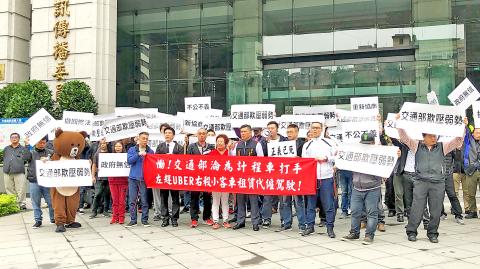Ride-hailing applications such as Uber are to be required to adopt hourly or daily rates to prevent them from eroding the market for metered taxi drivers, the Ministry of Transportation and Communications said on Thursday.
Although ride-hailing platforms apply a rate based on distance and minutes traveled, just like taxis, regulations would be amended over the next two months to create a fairer competitive environment, the ministry said.
For those charging an hourly rate, journeys under an hour should be counted as one hour, the ministry said, adding that operators could decide how much to charge per hour.

Photo: CNA
The mechanism would work the same for adopters of daily rates.
However, there would also be flexibility for different municipalities to regulate ride-hailing based on their respective needs, it said.
The regulations would make it clear that operators like Uber cannot pick up passengers on the street and that different drivers cannot take shifts under one account, the ministry said, adding that the platforms would be required to provide all information about their vehicles and drivers to the authorities.
Meanwhile, ride-hailing apps should also disclose information about cars, drivers and rates to users, the ministry said.
Taxi unions welcomed the changes, saying that they would better protect their rights.
Taipei Professional Drivers’ Union president Cheng Li-chia (鄭力嘉) said that the group would suspend a protest planned for Wednesday.
Taxi drivers would continue to closely follow progress on the amendments over the next two months before deciding whether to take further action, Cheng said.

A strong continental cold air mass is to bring pollutants to Taiwan from tomorrow, the Ministry of Environment said today, as it issued an “orange” air quality alert for most of the country. All of Taiwan except for Hualien and Taitung counties is to be under an “orange” air quality alert tomorrow, indicating air quality that is unhealthy for sensitive groups. In China, areas from Shandong to Shanghai have been enveloped in haze since Saturday, the ministry said in a news release. Yesterday, hourly concentrations of PM2.5 in these areas ranged from 65 to 160 micrograms per cubic meter (mg/m³), and pollutants were

Taiwan’s armed forces have established response protocols for a wide range of sudden contingencies, including the “Wan Chun Plan” to protect the head of state, the Ministry of Defense (MND) said today. After US President Donald Trump on Saturday launched a series of airstrikes in Venezuela and kidnapped Venezuelan President Nicolas Maduro, concerns have been raised as to whether China would launch a similar “decapitation strike” on Taiwan. The armed forces regularly coordinate with relevant agencies and practice drills to ensure preparedness for a wide range of scenarios, Vice Minister of National Defense Hsu Szu-chien (徐斯儉) told reporters before a

EVA Airways on Saturday said that it had suspended a pilot and opened an investigation after he allegedly lost his temper and punched the first officer several times as their plane was taxiing before takeoff at Los Angeles International Airport. According to a report published on Thursday by The Reporter, the incident occurred after the flight’s Malaysian first officer tried to warn the Taiwanese pilot, surnamed Wen (文), that he was taxiing faster than the speed limit of 30 knots (55.6kph). After alerting the pilot several times without response, the first officer manually applied the brakes in accordance with standard operating

NOT AN OPENING: Trump’s violation of international law does not affect China’s consideration in attacking Taiwan; Beijing lacks capability, not precedent, an official said Taiwanese officials see the US’ capture of the president of Venezuela as a powerful deterrent to Beijing’s aggression and a timely reminder of the US’ ability to defeat militaries equipped with Chinese-made weapons. The strikes that toppled Venezuelan President Nicolas Maduro signaled to authoritarian leaders, including Chinese President Xi Jinping (習近平), US President Donald Trump’s willingness to use military might for international affairs core to US interests, one senior official in Taipei’s security circle said. That reassured Taiwan, the person said. Taipei has also dismissed the idea that Trump’s apparent violation of international law could embolden Beijing, said the official, who was not